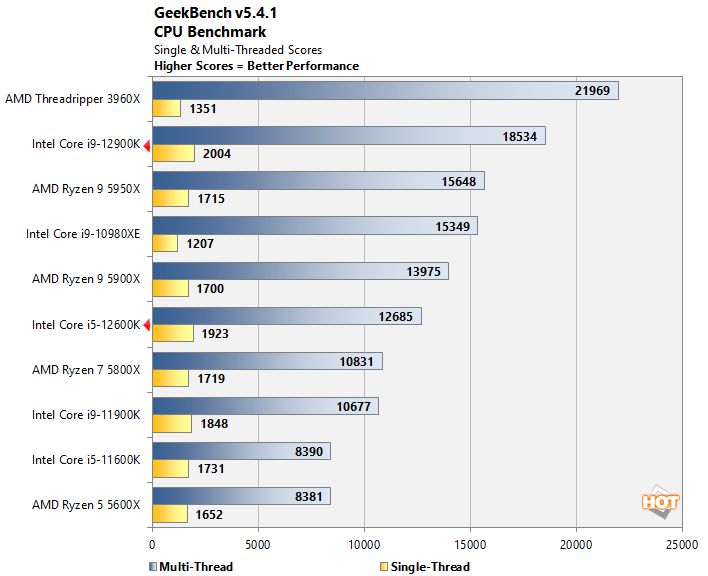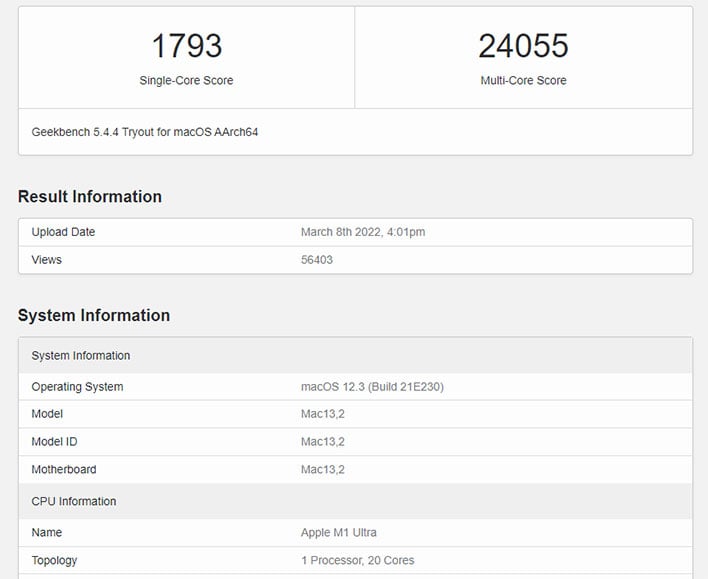Apple M1 Ultra Trounces Ryzen 9 5950X And Core i9-12900K In Multi-Threaded Benchmark

Apple is making some big performance claims related to its newly minted M1 Ultra chip, which is essentially a pair of M1 Max chips fused together. Will they stand up to scrutiny in the reviews circuit? Only time will tell, but as we wait to find out, a leaked benchmark run of the M1 Ultra highlights some impressive multi-threaded chops.
Built on a 5-nanometer manufacturing process, the M1 Ultra is a 20-core CPU with 16 high performance cores and four efficiency cores. Apple made use of a die-to-die interconnect architecture it's calling UltraFusion to bring two M1 Max dies together. In addition to the performance uplift this allows, it's recognized as a single chip by software so developers don't need to retool their code.
"The most common way to scale performance is to connect two chips through a motherboard, which typically brings significant trade-offs, including increased latency, reduced bandwidth, and increased power consumption. However, Apple’s innovative UltraFusion uses a silicon interposer that connects the chips across more than 10,000 signals, providing a massive 2.5TB/s of low latency, inter-processor bandwidth—more than 4x the bandwidth of the leading multi-chip interconnect technology," Apple explains.
Apple claims the M1 Ultra offers a 90 percent multi-threaded performance advantage over Intel's top dog in the consumer space, the Core i9-12900K. Of course, Apple didn't specific where exactly the full performance advantage is showcased, but a benchmark run on Geekbench indicates that it is generally faster in some multi-threaded workloads. Here's a look...
The early benchmark run has the M1 Ultra scoring 1,793 in the single-core test and 24,055 in the multi-threaded test. It's part of a Mac Studio configured with 128GB of unified memory (base model sports 64GB of unified memory). So this is at least a $4,799 system, and possibly $5,799 if it's using the version of the M1 Ultra with a 64-core GPU (versus 48-core).
In any event, these look like solid scores at first glance. How do they compare, though? While we're the ones who posted this benchmark, we do have a collection of scores we can compare against....

This is our most recent data, plucked from our Alder Lake performance review. Looking at the multi-threaded scores, the M1 Ultra fared around 30 percent better than the 16-core/24-thread Core i9-12900K, 54 percent better than the AMD's 16-core/32-thread Ryzen 9 5950X, and 9.5 percent better than the 24-core/48-thread Ryzen Threadripper 3960X.
Not A Clean Sweep Against Alder Lake
The single-core result looks pretty good too, though it's not a sweep. The Core i9-12900K scored 11.8 percent higher to take the top spot among those three CPUs. However, the M1 Ultra did beat the Ryzen 9 5950X by 4.5 percent and the Threadripper 3960X by 32.7 percent, when comparing against our own collection of scores.
What does this all mean? That we can be cautiously optimistic of the M1 Ultra being a beastly performing chip, depending on the workload. This shouldn't come as a huge surprise—we put the 8-core M1 through its paces in our Mac mini (2020) review and came away generally impressed. The M1 Ultra is a big upgrade over the M1.
Like everyone else, we're curious to see how it fares in a variety of real-world workloads. Geekbench scores are fun to digest, but far from the end-all, be-all in evaluating performance.


